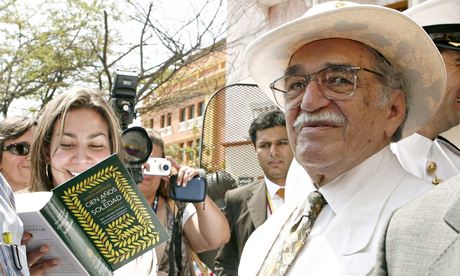 |
| Gabriel Garcia Márquez |
Others had used magic realism. García Márquez made the technique his own
An appreciation of the Colombian writer Gabriel García Márquez, who has died aged 87, by American novelist Edmund White
Edmund WhiteThe Guardian, Thursday 17 April 2014

Gabriel García Márquez with a fan – holding a special edition of One Hundred Years of Solitude – in Cartagena de Indias, Colombia, in 2007. Photograph: Ballesteros/EPA
One Hundred Years of Solitude is a masterpiece because it is an episodic novel that has a rigorous form – an unprecedented combination.
From the very beginning we know the town of Macondo will endure only a century, so there is a limit to the length of the narrative.
We discover that we are reading the book written by one of the characters, a Gypsy named Melquíades.
At the same time that Aureliano is reading the last pages (written in coded Spanish translated into Sanskrit) so are we; the town and the manuscript go up in flames just as the century comes to a close.
Picaresque or episodic novels are usually plagued with their lack of a sense of a necessary ending, but this book has a strong sense of closure.
This became a famous novel throughout the world because it was the first celebrated text that employed magical realism, the technique by which certain details in an otherwise normal world operate according to exceptional principles; I'll never forget the moment in his novel when the blood of a dead son travels all through the village to end up at the feet of his mother.
To be sure Jorge Luis Borges and the Cuban novelist César Vallejo had experimented with the style before him, but Gabriel García Márquez made it his own.
If he resembled William Faulkner in that he situated his book in a mythical place he invented, he resembled Ernest Hemingway in the simplicity of his style.
Spanish-language literature before him (and Borges) was verbose and given to multi-volume sagas.
García Márquez's genius was to condense a whole saga into one swift volume and to purify his style into a simplicity that was accessible to everyone.
Hundreds of writers throughout the world and in every language were influenced by his brightly-coloured, rapidly paced, clearly expressed style.
He could condense conquistadors, civil wars, the exploitation of banana combines into a whirling century of unforgettable prose.
(César Vallejo was a Peruvian poet, not a Cuban novelist.
I suspect that it's Alejo Carpentier who is being referred to here.)
Read also
DRAGON
SHORT STORIES
SHORT STORIES IN SPANISH
Ojos de perro azul (1947 - 1955)
LA TERCERA RESIGNACIÓN (1947)
EVA ESTÁ DENTRO DE SU GATO (1948)
DIÁLOGO DEL ESPEJO (1949)
OJOS DE PERRO AZUL (1950)
LA NOCHE DE LOS ALCARAVANES (1953)
Los funerales de la Mamá Grande (1962)
UN DÍA DE ÉSTOS (1962)
LA SIESTA DEL MARTES (1962)
UN DÍA DESPUÉS DEL SÁBADO (1962)
ROSAS ARTIFICIALES (1962)
LA VIUDA DE MONTIEL (1962)
La increíble y triste historia de Cándida Eréndira y de su abuela desalmada (1972)
EL MAR DEL TIEMPO PERDIDO (1961)
Doce cuentos peregrinos
LA LUZ ES COMO EL AGUA (1978)
BUEN VIAJE, SEÑOR PRESIDENTE (1979)
Otros cuentos
MESTER DE BREVERÍA
PESSOA

+(1).jpg)

No comments:
Post a Comment